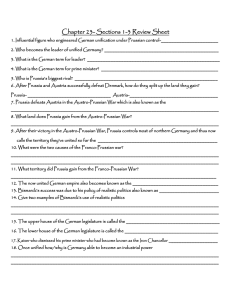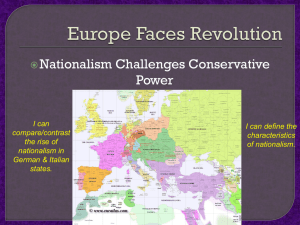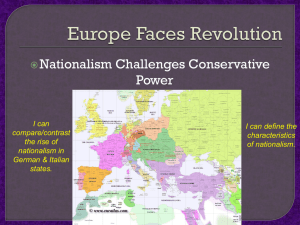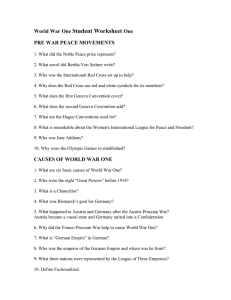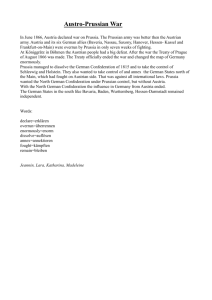DBQ – The Unification of Germany and Italy
advertisement
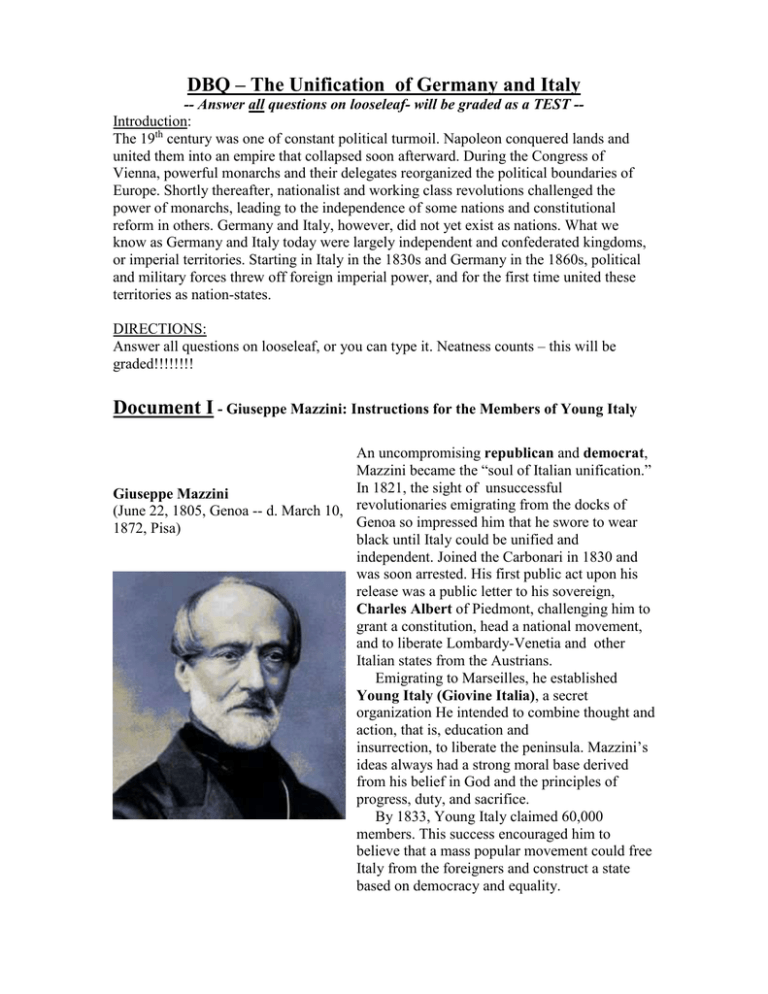
DBQ – The Unification of Germany and Italy -- Answer all questions on looseleaf- will be graded as a TEST -Introduction: The 19th century was one of constant political turmoil. Napoleon conquered lands and united them into an empire that collapsed soon afterward. During the Congress of Vienna, powerful monarchs and their delegates reorganized the political boundaries of Europe. Shortly thereafter, nationalist and working class revolutions challenged the power of monarchs, leading to the independence of some nations and constitutional reform in others. Germany and Italy, however, did not yet exist as nations. What we know as Germany and Italy today were largely independent and confederated kingdoms, or imperial territories. Starting in Italy in the 1830s and Germany in the 1860s, political and military forces threw off foreign imperial power, and for the first time united these territories as nation-states. DIRECTIONS: Answer all questions on looseleaf, or you can type it. Neatness counts – this will be graded!!!!!!!! Document I - Giuseppe Mazzini: Instructions for the Members of Young Italy An uncompromising republican and democrat, Mazzini became the “soul of Italian unification.” In 1821, the sight of unsuccessful Giuseppe Mazzini (June 22, 1805, Genoa -- d. March 10, revolutionaries emigrating from the docks of Genoa so impressed him that he swore to wear 1872, Pisa) black until Italy could be unified and independent. Joined the Carbonari in 1830 and was soon arrested. His first public act upon his release was a public letter to his sovereign, Charles Albert of Piedmont, challenging him to grant a constitution, head a national movement, and to liberate Lombardy-Venetia and other Italian states from the Austrians. Emigrating to Marseilles, he established Young Italy (Giovine Italia), a secret organization He intended to combine thought and action, that is, education and insurrection, to liberate the peninsula. Mazzini’s ideas always had a strong moral base derived from his belief in God and the principles of progress, duty, and sacrifice. By 1833, Young Italy claimed 60,000 members. This success encouraged him to believe that a mass popular movement could free Italy from the foreigners and construct a state based on democracy and equality. Instructions for the Members of Young Italy YOUNG Italy is a brotherhood of Italians who believe in a law of Progress and Duty, and are convinced that Italy is destined to become one nation--convinced also that she possesses sufficient strength within herself to become one, and that the ill success of her former efforts is to be attributed not to the weakness, but to the misdirection of the revolutionary elements within her--that the secret of force lies in constancy and unity of effort. They join this association in the firm intent of consecrating both thought and action to the great aim of re-constituting Italy as one independent sovereign nation of free men and equals.... Young Italy is Republican and Unitarian. Republican--because theoretically every nation is destined by the law of God and humanity, to form a free and equal community of brothers; and the republican is the only form of government that insures this future. Because all true sovereignty resides essentially in the nation, the sole progressive and continuous interpreter of the supreme moral law. Because, whatever be the form of privilege that constitutes the apex of the social edifice, its tendency is to spread among the other classes, and by undermining the equality of the citizens, to endanger the liberty of the country. Because, when the sovereignty is recognized as existing not in the whole body, but in several distinct powers, the path to usurpation is laid open, and the struggle for supremacy between these powers is inevitable; distrust and organized hostility take the place of harmony, which is society's law of life. Because the monarchical element being incapable of sustaining itself alone by the side of the popular element, it necessarily involves the existence of the intermediate element of an aristocracy--the source of inequality and corruption to the whole nation. Because both history and the nature of things teach us that elective monarchy tends to generate anarchy; and hereditary monarchy tends generate despotism. Because, when monarchy is not--as in the middle ages--based upon the belief now extinct in right divine, it becomes too weak to be a bond of unity and authority in the state. Because our Italian tradition is essentially republican; our great memories are republican; the whole history of our national progress is republican; whereas the introduction of monarchy amongst us was coëval with our decay, and consummated our ruin by its constant servility to the foreigner, and the antagonism to the people, as well as to the unity of the nation. Young Italy is Unitarian– Because, without unity, there is no true nation. Because, without unity, there is no real strength; and Italy, surrounded as she is by powerful, united and jealous nations, has need of strength before all things. Because federalism, by reducing her to the political impotence of Switzerland, would necessarily place her under the influence of one of the neighbouring nations. Because federalism, by reviving the local rivalries now extinct, would throw Italy back upon the middle ages. Because federalism would divide the great national arena into a number of smaller arenas; and, by thus opening a path for every paltry ambition, become a source of aristocracy. Because federalism, by destroying the unity of the great Italian family, would strike at the root of the great mission Italy is destined to accomplish towards humanity. Because Europe is undergoing a progressive series of transformations, which are gradually and irresistibly guiding European society to form itself into vast and united masses. Because the entire work of international civilization in Italy will be seen, if rightly studied, as to have been tending for ages to the formation of unity. Because all objections raised against the Unitarian system do but apply, in fact, to a system of administrative centralization and despotism, which has really nothing in common with unity. National unity, as understood by Young Italy, does not imply the despotism of any, but the association and concord of all. The life inherent in each locality is sacred. Young Italy would have the administrative organization designed upon a broad basis of religious respect for the liberty of each commune, but the political organization, destined to represent the nation in Europe, should be one and central. Without unity of religious belief, and unity of social pact; without unity of civil, political, and penal legislation, there is no true nation. Both initiators and initiated must never forget that the moral application of every principle is the first and most essential; that without morality there is no true citizen; that the first step towards the achievement of a holy enterprise is the purification of the soul by virtue; that, where the daily life of the individual is not in harmony with the principles he preaches, the inculcation of those principles is an infamous profanation and hypocrisy; that it is only by virtue that the members of Young Italy can win over the others to their belief; that if we do not show ourselves far superior to those who deny our principles, we are but miserable sectarians; and that Young Italy must be neither a sect nor a party, but a faith and an apostolate. As the precursors of Italian regeneration, it is our duty to lay the first stone of its religion. FROM Giuseppe Mazzini, 'General Instructions for the Members of Young Italy' (1831), in Selected Writings, ed. N. Gangulee, London, 1945, pp. 129 - 31. Questions: 1. According to the first paragraph, what was the primary belief of the members of Young Italy? What was their primary goal? _______________________________________________________________________ _______________________________________________________________________ _______________________________________________________________________ _______________________________________________________________________ _______________________________________________________________________ 2. In what way does Mazzini say Young Italy was “Republican”? _______________________________________________________________________ _______________________________________________________________________ _______________________________________________________________________ _______________________________________________________________________ _______________________________________________________________________ 3. How does Mazzini criticize aristocracy? How does he criticize monarchy as a form of government? _______________________________________________________________________ _______________________________________________________________________ _______________________________________________________________________ _______________________________________________________________________ _______________________________________________________________________ 4. According to Mazzini, why should Italy be united? _______________________________________________________________________ _______________________________________________________________________ _______________________________________________________________________ _______________________________________________________________________ _______________________________________________________________________ 5. Why was virtue important to Mazzini and Young Italy? _______________________________________________________________________ _______________________________________________________________________ _______________________________________________________________________ _______________________________________________________________________ _______________________________________________________________________ Document II – Documents of German Unification, 1848-1871 This collection of documents tells the story of the transition in Germany from revolutionary upheavals (1848) to political unification (1871). Read the first document, “Speech to the Frankfurt Assembly,” in which Johann Gustav Droysen contrasts Prussia and Russia Johann Gustav Droysen: Speech to the Frankfurt Assembly, 1848 We cannot conceal the fact that the whole German question is a simple alternative between Prussia and Austria. In these states German life has its positive and negative poles--in the former, all the interests which are national and reformative, in the latter, all that are dynastic and destructive. The German question is not a constitutional question, but a question of power; and the Prussian monarchy is now wholly German, while that of Austria cannot be. . . .We need a powerful ruling house. Austria's power meant lack of power for us, whereas Prussia desired German unity in order to supply the deficiencies of her own power. Already Prussia is Germany in embryo. She will "merge" with Germany… 6. What positive remarks does the author make about Prussia? _______________________________________________________________________ _______________________________________________________________________ _______________________________________________________________________ _______________________________________________________________________ _______________________________________________________________________ 7. What negative remarks does the author make about Prussia? _______________________________________________________________________ _______________________________________________________________________ _______________________________________________________________________ _______________________________________________________________________ _______________________________________________________________________ Read the next document, the proclamation of Friedrich Wilhelm IV, King of Prussia Friedrich Wilhelm IV, King of Prussia: Proclamation of 1849 I am not able to return a favorable reply to the offer of a crown on the part of the German National Assembly [meeting in Frankfurt], because the Assembly has not the right, without the consent of the German governments, to bestow the crown which they tendered me, and moreover because they offered the crown upon condition that I would accept a constitution which could not be reconciled with the rights of the German states. 8. What two reasons did Friedrich Wilhelm give for rejecting the crown of the national assembly in Frankfurt? _______________________________________________________________________ _______________________________________________________________________ _______________________________________________________________________ _______________________________________________________________________ _______________________________________________________________________ Read the next document, Bismarck’s “Letter to Minister von Manteuffel.” Otto von Bismarck: Letter to Minister von Manteuffel, 1856 Because of the policy of Vienna [the Congress of Vienna, 1815], Germany is clearly too small for us both [Prussia and Austria]; as long as an honorable arrangement concerning the influence of each in Germany cannot be concluded and carried out, we will both plough the same disputed acre, and Austria will remain the only state to whom we can permanently lose or from whom we can permanently gain. . . .I wish only to express my conviction that, in the not too distant future, we shall have to fight for our existence against Austria and that it is not within our power to avoid that, since the course of events in Germany has no other solution. 9. What developments did Bismarck anticipate in the relationship between Austria and Germany? _______________________________________________________________________ _______________________________________________________________________ _______________________________________________________________________ _______________________________________________________________________ _______________________________________________________________________ Read the next document from Field Marshall Helmuth von Moltke. “Hegemony” means dominance. Field Marshal Helmuth von Moltke: 1866 The war of 1866 [between Prussia and Austria] was entered on not because the existence of Prussia was threatened, nor was it caused by public opinion and the voice of the people; it was a struggle, long foreseen and calmly prepared for, recognized as a necessity by the Cabinet, not for territorial aggrandizement, for an extension of our domain, or for material advantage, but for an ideal end--the establishment of power. Not a foot of land was exacted from Austria, but she had to renounce all part in the hegemony of Germany. . . Austria had exhausted her strength in conquests south of the Alps, and left the western German provinces unprotected, instead of following the road pointed out by the Danube. Its center of gravity lay out of Germany; Prussia's lay within it. Prussia felt itself called upon and strong enough to assume the leadership of the German races. 10. What happened in 1866? What did Germany win? _______________________________________________________________________ _______________________________________________________________________ _______________________________________________________________________ _______________________________________________________________________ _______________________________________________________________________ Read the next document form Otto von Bismarck. Otto von Bismarck: 1866 We had to avoid wounding Austria too severely; we had to avoid leaving behind in her any unnecessary bitterness of feeling or desire for revenge; we ought rather to reserve the possibility of becoming friends again with our adversary of the moment, and in any case to regard the Austrian state as a piece on the European chessboard. If Austria were severely injured, she would become the ally of France and of every other opponent of ours; she would even sacrifice her anti-Russian interests for the sake of revenge on Prussia. . . .The acquisition of provinces like Austria Silesia and portions of Bohemia could not strengthen the Prussian state; it would not lead to an amalgamation of German Austria with Prussia, and Vienna could not be governed from Berlin as a mere dependency. . . .Austria's conflict and rivalry with us was no more culpable than ours with her; our task was the establishment or foundation of German national unity under the leadership of the King of Prussia. 11. Why did Germany avoid “wounding Austria too severely”? _______________________________________________________________________ _______________________________________________________________________ _______________________________________________________________________ _______________________________________________________________________ _______________________________________________________________________ The Imperial Proclamation, January 18, 1871 Whereas the German princes and the free cities have unanimously called upon us to renew and to assume, with the restoration of the German Empire, the German imperial office, which has been empty for more than sixty years; and Whereas adequate arrangements have been provided for this in the constitution of the German Confederation; We, Wilhelm, by the grace of God King of Prussia, do herewith declare that we have considered it a duty to our common fatherland to answer the summons of the united German princes and cities and to accept the German imperial title. In consequence, we and our successors on the throne of Prussia will henceforth bear the imperial title in all our relations and in all the business of the German Empire, and we hope to God that the German nation will be granted the ability to fashion a propitious future for the fatherland under the symbol of its ancient glory. We assume the imperial title, conscious of the duty of protecting, with German loyalty, the rights of the Empire and of its members, of keeping the peace, and of protecting the independence of Germany, which depends in its turn upon the united strength of the people. We assume the title in the hope that the German people will be granted the ability to enjoy the reward of its ardent and self- sacrificing wars in lasting peace, within boundaries which afford the fatherland a security against renewed French aggression which has been lost for centuries. And may God grant that We and our successors on the imperial throne may at all times increase the wealth of the German Empire, not by military conquests, but by the blessings and the gifts of peace, in the realm of national prosperity, liberty, and morality. Wilhelm I, Kaiser und König. Source: From: James Harvey Robinson, ed., Readings in European History, 2 Vols., (Boston: Ginn and Co., 19041905), II:571-575; Otto von Bismarck, The Man and Statesman, (New York, 1899), II:48-51 Scanned by: J. S. Arkenberg, Dept. of History, Cal. State Fullerton. Prof. Arkenberg has 12. Who called for King Wilhelm to assume the crown of Emperor? What “adequate arrangements” were made that enabled King Wilhelm to accept the title? _______________________________________________________________________ _______________________________________________________________________ _______________________________________________________________________ _______________________________________________________________________ _______________________________________________________________________ 13. What were two “duties” King Wilhelm accepted in this proclamation? What hope did he express? _______________________________________________________________________ _______________________________________________________________________ _______________________________________________________________________ _______________________________________________________________________ _______________________________________________________________________ 14. Choose ONE of the following options: Imagine that it is 1831 and you have decided to join Mazzini’s Young Italy. Write a persuasive letter to your boyfriend or girlfriend trying to convince him or her to join up with you. Make a timeline. Label points on the timeline to correspond with the documents on German unification you studied in this lesson. Include the significance of each document, or the event it describes. In your opinion, what was the most decisive event that led to German unification? Explain your point of view. [on looseleaf]
